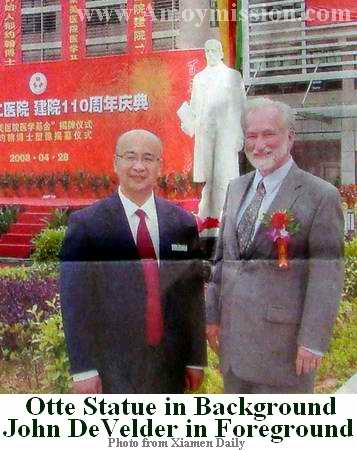 Bill Brown ... Xiamen University
Bill Brown ... Xiamen University"A good name is more desirable than great riches; to be esteemed is better than silver or gold." Proverbs 22:1
Practical Benevolence
In "The Story of the Amoy Mission" (1895), John MacGowan wrote,
Chinese stare at the foreigner, sometimes with skepticism or even thinly veiled contempt, but once they know you, “The crowd becomes sympathetic. The sneer dies out of their faces. There is nothing that touches the Chinese heart so mightily as practical benevolence. It is a virtue they highly appreciate. Their stolid, emotionless features begin to light up with genuine feeling, and the eyes of some are twinkling and flashing as their hearts are moved…[what] has just happened has been a mighty revelation. It has brought you closer to the Chinese heart than you were before, and it has revealed to you the wondrous possibilities of the future…”
Given the way that we foreigners barged in on China in the 1840s, forcing opium on them at gunpoint, it is little wonder they viewed us contempt. But in spite of this, and other indiginities such as extraterritoriality (in which virtually every foreigner enjoyed diplomatic immunity from punishment by Chinese for crimes—and used it), the Chinese were quick to forgive and even embrace individual foreigners once they trusted them, but it was not words that reached them but lives.
“There is nothing that touches the Chinese heart so mightily as practical benevolence.” Preaching certainly did not sway most of them. They responded to missionaries, “You carry Bibles in one hand and opium in the other. What kind of God do you serve? Is this the Way of Heaven?”
The church stood by silently not just in China but in other countries, and not just in the 19th century but the 20th. When the Nazis executed the young theologian Dietrich Bonhoeffer for opposing Hitler, the churches were preaching theology but ignoring the smell of burning flesh, in part because of the financial benefits they enjoyed from Hitler’s regime.
Even today, how many of us preach one message but live another, or by our silence condone or even defend what goes completely against the Good News?
A century ago, foreigners who served the Chinese instead of exploiting them, who helped bring modern medicine, education, music, arts and sports to China, touched hearts, and lives, and even today are remembered. Just last May, Xiamen government erected a statue to Dr. John Otte, who built Hope Hospital, and died after attending a Muslim plague victim at the Zhongshan Rd. mosque.
Chinese, and all peoples, are the same today. Empty preaching does not reach them; lives do.
In my early years in Xiamen, I decided to teach the poor laborers on campus English. Every day at noon they came to my office, and I was frustrated when, after a month, they could barely remember their ABCs, much less speak simple sentences. I was not a good English teacher. But my desire to help them encouraged them. One of the poor laborers decided to study accounting at night school. After he finished he got a low-paying job, worked hard and moved up, and eventually did well enough that he built a beautiful home in the countryside. He reminded me, much later, that my poor excuse of an English class opened his eyes to the possibility to rise above ditch digging.
Lives are touched not by words but by other lives. What life will we touch today?





No comments:
Post a Comment
Please leave a comment!